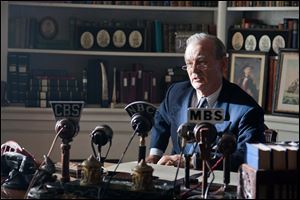
‘Hyde Park’ inspires look at Murray’s top portrayals
Actor takes on FDR's role in recent performance
12/10/2012
Bill Murray as Franklin D. Roosevelt in a scene from "Hyde Park on Hudson."
LOS ANGELES — This week, with the opening of the historical romance Hyde Park on Hudson, I finally get to do a Five Most list I’ve been thinking about for a while now: my favorite Bill Murray performances.
His take on President Franklin Delano Roosevelt may not be some of his best work, but it’s an unexpected bit of casting, and it provides a great opportunity to reflect on the fantastically eclectic career he’s put together over the past three-plus decades.
So here are my picks in chronological order. Honorable mention goes to his supporting turn as trash-talking bowling champ Ernie McCracken in the Farrelly brothers comedy Kingpin (1996), for the sweet hairpiece, if nothing else.
● Caddyshack (1980): Murray was at the height of his Saturday Night Live cult stardom when he gave his enduring portrayal of oddball golf course greenskeeper Carl Spackler in this all-time-great raunchy ’80s comedy. The character is a little grungy and a little dangerous and more than a little off, but also strangely sweet and the source of endlessly quotable lines. Murray has said that people shout Carl dialogue to him all the time as he’s playing golf in real life — “It’s in the hole!” — hoping he’ll recite the words back. That’s how much this movie and this character still matter in our crowded pop-culture universe.
● Stripes (1981): Murray is at his subversively charming best here in an early starring role as John Winger, a loser who decides to join the Army to be all he can be. He’s silly and sarcastic, confident and quick-witted, so naturally he has a little trouble respecting the authority of Warren Oates’ Sgt. Hulka, the platoon's “big toe.” But he earns a loyal following, becomes an inadvertent leader and even gets the girl in the end. Murray plays beautifully off old friend Harold Ramis as his straight man, and the whole anarchic vibe from Ivan Reitman, directing one of his best films, is an excellent fit for the comic’s persona during this period.
● Rushmore (1998): The beginning of a shift in Murray’s screen presence toward melancholy, introspective characters. The humor is still there but it comes from a different place: one of loss, regret, and self-destruction. Wes Anderson’s sweet and cleverly meticulous comedy is one of my favorite movies of all time, and Murray just broke my heart in it. He’s wealthy but he has nothing. He has a family but he constantly feels alone. In Jason Schwartzman’s precocious high schooler Max Fischer, he finds an unlikely soul mate. And in Olivia Williams’ first-grade teacher Miss Cross, he finds unexpected romance.
● Lost in Translation (2003): Murray earned an Oscar nomination for best actor for his portrayal of Bob Harris, an aging American actor who has schlepped to Tokyo to shoot a whiskey commercial that will pay him $2 million. He strikes a beautiful balance between lighthearted sarcasm and self-loathing as he forms an undefinable friendship with Scarlett Johansson, playing the bored, young wife of a celebrity photographer. To this day, I can’t listen to “More Than This” by Roxy Music without thinking of Murray’s delicate karaoke rendition in this lovely Sofia Coppola film.
● Broken Flowers (2005): He’d already appeared with deadpan hilarity in perhaps the best segment of Jim Jarmusch’s Coffee and Cigarettes. Here, Murray stars for Jarmusch as a middle-aged lothario on a half-hearted quest to visit old lovers in hopes of finding the teenage son he never knew he had. He learns about himself through his varied and unpredictable reunions with various ex-girlfriends. It’s yet another world-weary performance from Murray, but each incarnation of this persona reveals richness and shadings; his dramatic work in the later years of his career is just as strong as the wild comedy was in the beginning.